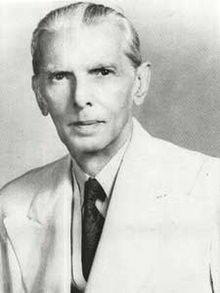Muhammad Ali Jinnah (born Mahomedali Jinnahbhai; 25 December 1876 – 11 September 1948) was a lawyer, politician, and the founder of Pakistan.[1] Jinnah served as leader of the All-India Muslim League from 1913 until Pakistan's independence on 14 August 1947, and then as Pakistan's first Governor-General until his death. He is revered in Pakistan as Quaid-i-Azam (Urdu: قائد اعظم; Great Leader) and Baba-i-Qaum (Urdu: بابائے قوم; Father of the Nation). His birthday is observed as a national holiday in Pakistan.[2][3]
Born at Wazir Mansion in Karachi, Jinnah was trained as a barrister at Lincoln's Inn in London. Upon his return to British India, he enrolled at the Bombay High Court, and took an interest in national politics, which eventually replaced his legal practice. Jinnah rose to prominence in the Indian National Congress in the first two decades of the 20th century. In these early years of his political career, Jinnah advocated Hindu–Muslim unity, helping to shape the 1916 Lucknow Pact between the Congress and the All-India Muslim League, in which Jinnah had also become prominent. Jinnah became a key leader in the All India Home Rule League, and proposed a fourteen-point constitutional reform plan to safeguard the political rights of Muslims. In 1920, however, Jinnah resigned from the Congress when it agreed to follow a campaign of satyagraha, which he regarded as political anarchy.
By 1940, Jinnah had come to believe that Muslims of the Indian subcontinent should have their own state. In that year, the Muslim League, led by Jinnah, passed the Lahore Resolution, demanding a separate nation. During the Second World War, the League gained strength while leaders of the Congress were imprisoned, and in the elections held shortly after the war, it won most of the seats reserved for Muslims. Ultimately, the Congress and the Muslim League could not reach a power-sharing formula for the subcontinent to be united as a single state, leading all parties to agree to the independence of a predominantly Hindu India, and for a Muslim-majority state of Pakistan.
As the first Governor-General of Pakistan, Jinnah worked to establish the new nation's government and policies, and to aid the millions of Muslim migrants who had emigrated from the new nation of India to Pakistan after independence, personally supervising the establishment of refugee camps. Jinnah died at age 71 in September 1948, just over a year after Pakistan gained independence from the United Kingdom. He left a deep and respected legacy in Pakistan. Innumerable streets, roads and localities in the world are named after Jinnah. Several universities and public buildings in Pakistan bear Jinnah's name, while his career influenced a number of activists including Malala Yousafzai. According to his biographer, Stanley Wolpert, he remains Pakistan's greatest leader.


No comments:
Post a Comment